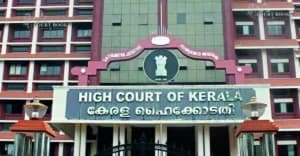The Kerala High Court has ruled that an educational institution, even when operated by a charitable educational trust, must register under the Kerala Value Added Tax (KVAT) Act if it supplies food through its canteen. This landmark decision came in a case involving Annoor Dental College, which was found to have crossed the turnover threshold and failed to register under the KVAT Act for the assessment years 2013–14 and 2014–15.
The case revolved around whether the institution, operated by the Annoor Educational Trust, needed to register under the KVAT Act for its canteen operations, which generated income through mess fees and the sale of student kits and materials.
Proceedings were initiated under Section 67(1) of the KVAT Act, 2003, after authorities noted that the college was conducting sales but had not registered under the Act. The penalty was levied for non-registration and non-payment of VAT for the years in question.
The college initially appealed the penalty orders before the Deputy Commissioner (Appeals), who ruled in its favor and set aside the penalties. However, the State then challenged this decision before the Kerala Value Added Tax Appellate Tribunal, arguing that the college could not escape mandatory registration simply because it is managed by a charitable trust.
The Tribunal partly allowed the State’s appeal and ruled that even if some charges were considered as mess fees, canteen sales cannot be excluded from VAT assessment if they are not proven to be collected under that head. It directed the college to take registration and asked the assessing officer to complete the assessment under Section 25(1) of the Act.
The High Court bench, comprising Justice Dr. A.K. Jayasankaran Nambiar and Justice Easwaran S., dismissed the revision petitions filed by Annoor Dental College. The court observed:
“The tribunal has not decided any question against the assessee, but has only directed the authority to verify whether mess fees are collected in lieu of canteen sales.”
The court held that no substantial question of law arose in the petitions and thus, no interference was necessary.
- Definition of “Business” and “Dealer” Under KVAT Act:
The court referred to Section 2(ix) and Section 2(xv) of the KVAT Act: “The definition is inclusive enough to cover each and every activity done by a person, other than in due course of his business...” Thus, even if the college's primary activity is education, ancillary activities like operating a canteen still bring it within the purview of a "dealer". - Threshold Argument Not Valid:
The college argued that the canteen sales were below the threshold limit, and hence, registration wasn't necessary. However, the court disagreed: “It may be true that the sales across the counter in the canteen may be within the threshold limit, but that by itself will not enable the revision petitioner to contend that it is not bound to take registration under the provisions of the KVAT Act.” - Canteen Sales vs. Mess Fees:
The court noted that the tribunal’s direction was not to impose tax outright, but to verify if the charges collected were indeed mess fees. The final tax liability depends on this verification.
The petitioner cited a judgment from the Uttarakhand High Court (Scholors Home Senior Secondary School v. State of Uttarakhand) to support the argument that ancillary services of educational institutions shouldn’t be taxed. The Kerala High Court dismissed this, stating:
“That decision was based on different facts and under a different statutory framework, which varies substantially from the KVAT Act.”
The Kerala High Court concluded:
“No substantial question of law arises for consideration in the present revision petitions. We find no merit in the revision petitions. They are accordingly dismissed.”
There was no order on costs.
In view of the above, the bench dismissed the revision petition.
Case Title: M/s Anoor Dental College v. State of Kerala
Case Number: OT.REV NO. 4 OF 2025
Counsel for Petitioner/Assessee: P.N. Damodaran Namboodiri and Hrithwik D. Namboothiri
Counsel for Respondent/Department: Resmitha Ramchandran















